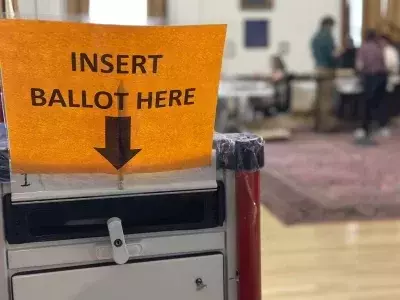
The Trump administration is reportedly conditioning election security grants on states' adherence to specific voting policies. This move, affecting millions in Department of Homeland Security funds, has drawn criticism from election officials and experts who view it as an attempt to exert political influence over election procedures. Several states are now opting to forgo these crucial funds rather than comply with the new stipulations, raising concerns about the true commitment to election integrity. This development comes amidst broader concerns about the administration's approach to election oversight and its potential impact on the integrity of the voting process across the nation.
The controversy centers around new directives tied to the Department of Homeland Security's (DHS) grant program, specifically an allocation of approximately $28 million earmarked for election security. Previously, these funds were intended to bolster state and local government defenses against terrorism and natural disasters, with election security being a designated priority. However, the Trump administration, influenced by a March 25 executive order concerning voting integrity, has introduced stringent new requirements for states seeking these funds. These conditions, made public in late July, are perceived by many as an attempt to enforce specific voting policies at the state level.
Among the contentious new requirements is the mandate that jurisdictions applying for the grants must prioritize compliance with new federal guidelines for voting system certification. These guidelines are so recent that no state has yet incorporated equipment certified under these standards, raising questions about the feasibility of compliance and how DHS plans to adjudicate such a provision. Furthermore, another stipulation demands that localities utilize a new DHS citizenship verification tool, known as the SAVE system, for all polling place personnel, regardless of their role. This system's rapid expansion and its recent ability to verify U.S.-born citizens have raised privacy concerns, and its accuracy and reliability remain largely undisclosed by the agency. Maine's Secretary of State, Shenna Bellows, a Democrat, has openly rejected these new rules, describing them as an unacceptable backdoor attempt by DHS to alter state election laws. Maine is consequently foregoing around $130,000 in grant money.
The broader implications of these conditional grants extend beyond the immediate election security funds. Experts, such as Larry Norden from the Brennan Center for Justice, express apprehension that similar conditionalities could be applied to hundreds of millions of dollars in other grants intended for law enforcement and counter-terrorism efforts. The concern is that if states do not conform to the election-related mandates, they might risk losing out on significant financial aid for critical public safety initiatives. The removal of language from the 2024 rules that explicitly prohibited the use of grant money for activities that could suppress voter registration or turnout further exacerbates these worries, fueling speculation about the administration's underlying intentions regarding electoral participation.
This situation underscores a growing tension between federal oversight and state autonomy in election administration. While the financial sum directly at stake for election security might seem modest in the grand scheme of national elections, the principle of linking federal aid to specific state-level policy adoption raises profound questions about political influence and the independence of electoral processes. Many officials and experts are left to ponder whether these new conditions genuinely enhance election security or instead serve to impose a particular political agenda, potentially undermining the cooperative framework that traditionally supports robust and secure elections across diverse jurisdictions.
